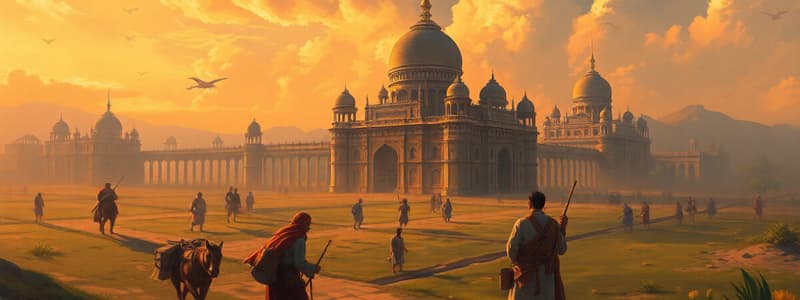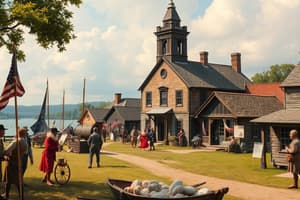Podcast
Questions and Answers
How does the study of dates contribute to our understanding of history?
How does the study of dates contribute to our understanding of history?
- Dates only help in remembering names of historical figures.
- Dates are irrelevant to the story of history.
- Dates help identify the chronology of events. (correct)
- Dates provide a fixed meaning to all events.
According to James Mill, how did he categorize Indian history?
According to James Mill, how did he categorize Indian history?
- Hindu, British, and Colonial periods.
- Civil, Religious, and Political periods.
- Hindu, Muslim, and British periods. (correct)
- Ancient, Medieval, and Modern periods.
What aspect of history does colonization affect according to the content?
What aspect of history does colonization affect according to the content?
- Only the economy of the colonized country.
- Cultural changes predominantly.
- Historical artifacts only.
- Social, cultural, economic, and political spheres. (correct)
What limitation is pointed out regarding official records from the British administration?
What limitation is pointed out regarding official records from the British administration?
Which source of information is NOT mentioned as important for studying British rule?
Which source of information is NOT mentioned as important for studying British rule?
What role did surveys play under colonial administration?
What role did surveys play under colonial administration?
How do we gain a comprehensive understanding of British administration?
How do we gain a comprehensive understanding of British administration?
What does focusing on specific dates in history help to determine?
What does focusing on specific dates in history help to determine?
Flashcards
Why are dates important in history?
Why are dates important in history?
Dates help understand the order of events, compare the past to the present, and identify the significance of events. They provide a timeline for historical understanding.
What makes a date important for historians?
What makes a date important for historians?
The selection of a date depends on the specific story or event being studied. Important dates reveal key turning points and significant changes in history.
How is history divided into periods?
How is history divided into periods?
Different historical periods are created based on significant events, changes in society, and political shifts. These divisions help us study history in chunks and understand its evolution.
What is colonialism?
What is colonialism?
Signup and view all the flashcards
What are administrative sources?
What are administrative sources?
Signup and view all the flashcards
Why are surveys important historical sources?
Why are surveys important historical sources?
Signup and view all the flashcards
Limitations of official records:
Limitations of official records:
Signup and view all the flashcards
What do official records not tell us?
What do official records not tell us?
Signup and view all the flashcards
Study Notes
How Important are Dates?
- History involves changes over time
- History is synonymous with dates
- Comparing the past to the present
- Associating history with a sequence of dates
Which Dates?
- Choosing dates depends on the event's importance
- Focusing on specific events is key for understanding
- Studying dates helps understand reasons and consequences
How do we Periodise?
- James Mill divided Indian history into three periods: Hindu, Muslim, and British
- Mill believed only British rule, culture, and laws could civilize India
- Historical evidence provides a timeline of events
What is Colonial?
- Colonization occurs when one country subjugates another
- This results in changes to social, cultural, economic, and political spheres
- Colonization alters values, customs, and practices
How do We Know Administration?
- Official records from the British administration are a key source
- British preserved important documents and letters
- Archives and museums were created to preserve these materials
Sources of Information
- Official records, letters, memos, surveys, and newspapers are important sources
- Traveller's accounts, novels, poems, and autobiographies provide insights
- Surveys (botanical, zoological, archaeological, and anthropological) document the period
- Records from both British and Indians provide a wider perspective
What do Official Records not Tell?
- Official records don't fully represent the needs of the Indian population
- They often hide the truth and show only a single aspect of an event
- They don't always reflect the reactions and situations of all Indians in society
Studying That Suits You
Use AI to generate personalized quizzes and flashcards to suit your learning preferences.
Related Documents
Description
This quiz explores significant dates in history and their importance in understanding historical events. It examines the periodization of Indian history by James Mill and the impact of colonization. Test your knowledge on how historical records shape our understanding of the past.




